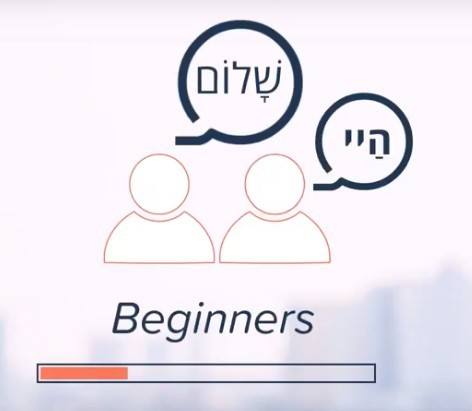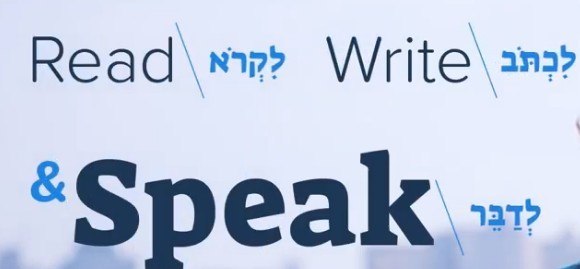 Hebrew culture and the Hebrew language are very interesting subjects that many people wish to learn more about. If you’re one of the people interested in learning the Hebrew language, this article is for you! In order to study them, you could go to Jerusalem and enroll in the Hebrew University, which has been teaching people the Hebrew language for over 70 years. But, many people can’t relocate in order to study the Hebrew language and learn more about the culture.
Hebrew culture and the Hebrew language are very interesting subjects that many people wish to learn more about. If you’re one of the people interested in learning the Hebrew language, this article is for you! In order to study them, you could go to Jerusalem and enroll in the Hebrew University, which has been teaching people the Hebrew language for over 70 years. But, many people can’t relocate in order to study the Hebrew language and learn more about the culture.
So, if you’ve ever wondered how to learn the Hebrew alphabet, the online courses offered by the Rosen School of Hebrew is an excellent, convenient option. With their courses, you’ll learn the Hebrew alphabet, the language, and learn about the culture, all from your own home and at your own pace. In this article, you’ll learn all about their Hebrew language courses, get an overview of the courses, and learn how to learn the Hebrew alphabet.
About the Rosen School of Hebrew
The Rosen School of Hebrew is named after a well-known Hebrew teacher named Aharon Rosen, who was the founder of the school’s grandfather. Aharon Rosen developed books and a curriculum to teach adults the Hebrew language. These books and the curriculum are still used today as the standard method to teach people the Hebrew language. This school is an adaptation of his works and teachings, designed for online courses. The courses on the Hebrew language offered by the Rosen School of Hebrew are for anyone- whether you’re Jewish or not. If you’re interested in Hebrew culture, there’s no reason not to sign up.
The courses teach not only the Hebrew language, but Israeli culture, as well. The teachers are all native to Israel. And they include all-star educational gems such as: Aya Back-Shoval, a modern Hebrew teacher with 45 years of experience, Daniel Birnbaum, M.A., who has been a Yiddish teacher at Tel Aviv University since 2007, plus many others. You can rest assured that it’s a great institution to teach the Hebrew language because it’s a partner of the Hebrew University in Jerusalem. And, all of the courses are fully accredited, and can be taken for university credit.
The online course medium that the Rosen School of Hebrew uses is great for a multitude of reasons. You have different ways to catch lectures, both live and recorded, so that if you miss one, you can still listen to it. You have several ways to communicate with your teacher. And you can even communicate with your classmates in an online forum.
Plus, there are a variety of course materials, with audio recordings, videos, and texts to read. And they use a “Hebrew in Hebrew” teaching method so that you learn the Hebrew language from not only hearing your teacher speaking it, but from speaking it yourself and immersing yourself in the language. The combination of convenience and proven language teaching methods will provide you with a thorough understanding of the Hebrew language that you can learn on your own time, at your own pace.
Course 1: Hebrew for Novices
This course is where the magic happens. If you’re looking to learn the Hebrew alphabet, this is the course to take! You don’t just get a copy of the alphabet, you’ll learn what each letter sounds like, how it’s used, and how they look both written and printed. Not only that, you’ll learn 400 Hebrew words, numbers, present-tense verbs, pronouns, and prepositions. You’ll even learn to speak them, practicing conversations daily and listening to dialogues.
The course was developed by Tamar Weyl and Shira Cohen-Regev, both of which have a lot of experience in teaching the Hebrew language. Tamar Weyl has taught the Hebrew language to people around the world as a senior lecturer at the Rothberg International School for Foreign Students at the Hebrew University in Jerusalem. She’s also written textbooks and designed computer programs that teach the language. And, Shira Cohen-Regev has developed lots of online courses for both students and educators.
Course Syllabus Outline
Sure, you know that Course 1 will teach you the Hebrew alphabet. But, there are 19 units in this course that cover a lot more than just the alphabet! Here is an overview of what’s covered in each unit:
1. In this unit, you’ll discover how you can introduce yourself, as well as learn how to write, identify and utilize the first 6 letters.
2. In this class, you’ll learn additional Hebrew letters, words and ways to start a dialogue.
3. In this part, you’ll learn more Hebrew words and conversation techniques. You’ll hold a conversation with your teacher by the end of this unit.
4. In this unit, you’ll learn how to recogize objects by their proper gender, and learn more words.
5. In this unit, you’ll learn the 10 different personal pronouns, their uses, and how to use in plural form some verbs.
6. This part reviews all of the letters, their order in the alphabet and the Nikkud symbols.
7. This unit teaches the verb system in Hebrew and how to use verbs in the present tense.
8. This unit teaches different verb categories and gets you familiar with the concept of infinitives.
9. This unit teaches you how to be polite, which situations call for politeness, and how to apologize.
10. This class teaches the numbers 0-10, how to pronounce your phone number, and how to ask for a phone number.
11. This unit teaches you how to tell time and describe your routine.
12. This unit teaches you words in order to describe the existence of items, such as the situation described in the unit’s title: “There is no wine, but there is beer”.
13. This unit teaches you new question words that deal with destinations.
14. This unit teaches the days of the week, how to express what you have or don’t have, and expands on your presentation abilities.
15. This unit teaches some new verbs and prepositions.
16. This unit teaches you how to tell someone your age and count from 1-100.
17. This unit teaches some new verbs and how to count feminine objects.
18. This unit teaches how to count masculine objects, and identify family members.
19. This unit reviews the whole course, teaches you words for different parts of the house, and how to say goodbye – which you’ll then do to your classmates and teacher, taking a further step to learning the Hebrew language.
Courses 2 & 3: Hebrew for Beginners and Intermediate Hebrew
These two courses expand upon the first course, Hebrew for Novices. The 2nd course teaches you words to use in common situations and settings, such as shopping, going to a restaurant, and going to the doctor’s office. You’ll learn to read fluently in Hebrew during this course, as well. You’ll be taught 350 new words, as well as more present tense verbs and infinitives. You’ll also learn adverbs to describe time, pronouns, and adjectives. And, you’ll do exercises to practice writing and reading in Hebrew.
Course 3 will increase your fluency. You’ll learn 250 more words, which will expand your conversational vocabulary. You’ll also learn past tense words, direct and indirect speech, phrases that indicate cause and effect, and conditional words. Not only that, you’ll start reading texts that pertain to Israeli culture and issues, and learn how to express your opinions about these topics in Hebrew.
 Courses 4 & 5: Advanced Hebrew and Hebrew for Adepts
Courses 4 & 5: Advanced Hebrew and Hebrew for Adepts
In course 4, you’ll learn more about Israeli culture by reading Hebrew literature and poetry. You’ll learn about different historical figures and places, as well as take part in discussions about them. And, you’ll learn 300 words, use verbs in the future tense, complex prepositions, and learn to develop complex sentences.
Course 5 is an advanced course that will teach you 300 more words, more about verbs in all the different types of tenses, and complex grammar. The reading in this course is more advanced, as well. You’ll be practicing reading and writing in Hebrew. And, you’ll be listening to recordings in Hebrew and then comparing your life experience to those on the recordings.
Course 6: Hebrew for Experts
All of the texts in this course were written for those who speak native Hebrew. By the end of the unit, you’ll know 1,700 words. You’ll understand sentence structure, verb tenses and exceptions to grammatical rules. And, you’ll be writing and expressing your opinions about everything you’ve read up to this point, in Hebrew.
Course 7: Hebrew for Masters
This is an advanced course, as the name suggests. In it, you’ll be reading newspaper articles on a wide array of topics – from art and education to biographies. This will expose you to Israeli culture. But, the articles will have different syntax issues to identify and discuss, as well. So, you’ll be more fluent in the Hebrew language by the end of the course.
Course 8: Professional Hebrew
This is the final course, and therefore the most advanced. By the end of it, you’ll be able to read whole newspapers in Hebrew, and not only discuss the topics in it, but learn new expressions from it. You’ll also be writing pieces in fluent Hebrew during this course. And, you’ll be surfing contemporary Hebrew websites and reading them fluently by the end of the course.
At this point, you’ll be able to speak, read and write in Hebrew, and have a pretty good understanding of Israeli culture and history. You’ll not only speak the language, but be able to identify some historical Israeli places, literature and figures.
The Rosen School of Hebrew is the best way to go if you want a good education in Hebrew language and culture. You really can’t beat the convenience of their online courses, and their partnership with the Hebrew University of Jerusalem. If you have to work during one of the lectures, you can listen to the recorded lecture once you’re off work.
If you work the night shift, you can do your studying any time you want. And, it doesn’t matter how you learn best because there are a variety of teaching methods that are used: videos, recordings, texts and hands-on education in the form of speaking the language with your teacher and classmates. This virtually guarantees that you’ll learn the language.
These courses will teach you how to read, write and speak in Hebrew. And you’ll learn about social issues that concern the Israeli people, their culture and history. You’ll know about important historical places, events, and figures. You’ll even be able to surf websites that are written in Hebrew!
So, by the end of the course, there’s no reason you couldn’t visit Israel and immerse yourself in the language and culture. You can speak the Hebrew language with native Israeli people, without fear of being misunderstood or lacking some common knowledge that will make you stand out as an outsider.
So, if you’ve ever wondered how to learn the Hebrew alphabet, now you know!

